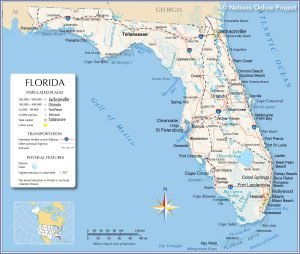Elon Musk Discusses His Vision for Future Martian Government at SXSW

Americans like to refer to the USA’s system of government as a democracy. However, technically, our government is a republic in which voters elect representatives who can make decisions on important issues for them. Only in rare cases can citizens directly vote on issues, and those tend to be local- and state-level issues that only get on the ballot after the supporters (or opponents) of any particular position on an issue have jumped through a few hoops that usually includes collecting so many signatures.
As Elon Musk noted at SXSW, a republic consisting of representatives from each state, with separate executive and judiciary branches, may have been the best that the Founding Fathers could do at the time. He said of the difficulties involved:
“There was no way for people to communicate instantly. A lot of people didn’t have access to mailboxes, the post office was primitive. A lot of people couldn’t write. So you had to have some form of representative democracy or things just wouldn’t work at all.”
What does Elon Musk recommend now that the Internet exists, people are generally better educated or at least capable of hopping on Youtube and Udemy if they want to learn something new, and people are seriously talking about Martian colonies? He thinks a direct democracy might be feasible.
“Most likely, the form of government on Mars would be something of a direct democracy […] where people vote directly on issues instead of going through representative government.”
Possible Challenges
Would people care enough to educate themselves about the issues before they vote?
This can be one of the biggest challenges of any system in which citizens have the right to vote. In America, one of the biggest challenges of a two-party system is that a lot of people don’t really care much about the issues so long as “their party” wins, or else they are single-issue voters. Other voters take the attitude that they need to vote for the “lesser of two evils” because they believe that none of the third party or independent candidates that might better represent their views can win. This causes a myopic view in which voters go to the polls without having thoroughly researched the candidates and issues that they are voting on.
How can this problem be solved without creating an unintentional throwback to the days when some states required a literacy test in order to vote? Blocklancer is in the process of creating a system that might solve this problem called the Token Holder Tribunal. First, voters in any given dispute or issue have to prove that they have a stake in the outcome by holding so many Lancer Tokens. Second, to get the reward for voting, voters have to prove that they inspected the evidence and educated themselves about the issue at hand. A similar system would require voters in a future Martian direct voting system to prove that they educated themselves about the issues to be voted on before they can cast a vote and/or receive an incentive for the vote. It works on the assumption that, if you think it’s a waste of your time to educate yourself about the issues, then you probably also think it’s a waste of your time to vote.
After a few generations, Martians may just take that kind of system as just the way it is. Sure, the new immigrants will probably complain, but they’ll come around after a few voting cycles in which their vote didn’t count.
Would people care enough to even bother voting?
A lot of eligible voters make excuses for failing to show up at the polls on election day. They might have never bothered to register to vote. They might think that their vote won’t make a difference. They might not have had time to hit the polls before going to work or during their lunch break and forgot to mail in their absentee ballot. And then, of course, these non-voters complain about the outcome of an election.
The problem of eligible voters failing to register might be most easily solved by automatically registering people who are eligible to vote and making sure that their voter registration follows them when they move, and de-registering them when they die or otherwise become ineligible.
How can we convince people that their vote can make a difference? I’ve heard of local candidates winning by just one or two votes. However, it can be difficult to convince people who think that only the national level elections matter short of making their eyes glaze over with an infodump about local and state rights. It may be easier to incentivize voting; for instance, by paying them for their time in a manner similar to the Token Holder Tribunal.
Who has time to go to the polls? On Mars, the issue of, “I have no time to vote” may turn into, “I’m too busy keeping the hardware together with both hands and a lot of duct tape to take a few minutes to vote.” Actually, absentee ballots were pretty much an acknowledgment that it might be easier for some people to mail in their ballots than it is for them to even find their polling place. West Virginia is taking that one step further with a blockchain-based system that will allow its active duty military personnel to vote while deployed. If it works, it could become the basis for a direct voting system in which Martians don’t even have to budge from their workstation in order to vote.
Would the issues to be voted on be comprehensible to the voters?
Elon Musk recommended, “Keep laws short. […] Something suspicious is going on if there’s long laws.”
Anyone who remembers the minutiae of the debate over Obamacare may recall Nancy Pelosi’s infamous statement, “We need to pass it to find out what’s in it.” That may have even left some Democrats who are capable of critical thinking rather than blindly following whatever their party leaders say on TV scratching their heads. If not even our representatives in Congress know what’s in that bill, then they are not doing their jobs and the Affordable Care Act was way too long at 10,000 pages of tiny type anyway. Nobody, not even our representatives in Congress, can be expected to sit there and read a bill that long. So there should be limits on how long a measure to be voted on can be, preferably given as a maximum number of words.
Voters should also not be expected to do mental gymnastics in order to comprehend the issues that they are voting on. Although President Trump is often criticized for speaking at a fourth grade level when he’s comprehensible at all, he may have just realized that most people aren’t intellectuals with doctorate degrees. I don’t mean that as an insult to voters, not even the ones who bought into “Make America Great Again”. It simply means that the issues to be voted on should be presented at a reading level that most voters can understand.
The problem here is that many issues and amendments that make it onto the ballot are poorly worded. This may or may not be intentional on the part of their backers, depending on what they aim to get out of it. Investors who want to place a new “factory farm” in a neighborhood where there previously was none are obviously in it for the profit and therefore may word their side of the issue in a confusing way, while activists who want to decriminalize marijuana may simply care about people not getting a criminal record just because they got caught with a couple ounces of pot and have less incentive to make their issue anything but clear.
Either way, voters have to read each issue on the ballot carefully to make sure they aren’t voting the opposite way of what they want to, and that’s if the wording is even comprehensible. It would not surprise me if the readability of some of those proposed amendments would turn out to be at a high school level or above if analyzed by an expert. That may be above the level at which most voters even care to make a serious attempt to comprehend what the proposed measure even says. So there should be incentive to ensure that each measure to be voted on is not only short, but also clear so that voters don’t have to pass it in order to find out what’s in it.
What happens if someone attempts to tamper with results?
This is rather a contentious issue, at least here in the United States. Attempts to keep the rolls accurate by removing voters who might have died or moved have been tied up in the courts and caused states to hesitate to remove ineligible voters so they don’t get socked with major legal fees. Attempts to require a photo ID in order to vote has led to accusations of racism. This becomes a nuisance when someone casts a ballot in the name of a deceased voter or an eligible voter shows up to vote only to find out that somebody has already fraudulently cast a ballot in their name.
This could inspire verification procedures that could be called paranoid by some observers. The voting system could require that voters vote on the exact mobile device that they downloaded the app on or report it if the device is lost, stolen, or malfunctioning. It may be feasible to require a DNA sample, a fingerprint, a voiceprint, a pulse, a passcode, or any combination of those five before the user can vote. If the voter is reported as having died, moved, or otherwise become ineligible to vote in his or her precinct, then that information is propagated to all relevant apps, including the voting app. After a few generations, future Martians may just take it for granted that their voting rights will change appropriately if they move from one colony to another or die in an accident.
What if voting equipment can be tampered with? It could happen. At the polling place I’ve previously worked at, the voting machine was supposed to print off a tape with the precinct’s voting results, both before the poll opens in the morning and after the poll closes in the evening. If the tape showed more than zero votes before the poll opened, then the voting machine may have been tampered with and will definitely have to be replaced with another one. After the poll closes, the tape supposedly provides a way to verify the results in the event that erroneous results were transmitted back to the county offices, though, again, if the total number of votes in a contest does not match the total number of votes cast, either there was an error in the machine’s code, or it may have been tampered with.
As importantly, attempts to tamper with results should be disincentivized to the point where doing so would be considered more costly than it’s worth. The Bitcoin network can do this by throwing sheer hashrate at the problem, but that may not be feasible in an environment where computing power could be used for other things tied to simple survival. Besides that, all the system security in the universe won’t stop someone who is determined enough and clever enough to invent an attack that was not anticipated by the system’s designers. So penalties will have to be put in place that are costly enough to the guilty parties that tampering will be deemed not worth the cost, regardless of the perceived benefits. Those penalties will have to be severe enough to discourage those who think they “know better” than the majority of voters and consistently enforced regardless of who tampered and why.
Possible Positives
Can Reduce or Eliminate Influence of Career Politicians
Early on in U.S. political history, it was assumed that politicians would also have lives and careers outside of being politicians. Congress was only expected to meet a few times a year and/or when there were important decisions to be made. In this way, they would have a better connection with ordinary people who never went into politics. Of course, politicians didn’t stay that way and politics is now considered a viable career path.
When direct voting is implemented, on Mars or elsewhere, it dilutes or entirely eliminates the need for representative governments. While career politicians may not appreciate having their influence watered down or losing their jobs, it will create an environment in which the chef will have to live with the fact that colonists voted to have cream peas instead of carrot casserole with their dinner tonight because he keeps burning the carrot casserole. Hey, that’s worth something when you don’t want to put up with eating burned carrot casserole every day of your life on top of holding the hardware together with both hands and a lot of duct tape and the chef just won’t listen.
Are you a single issue voter? Most people aren’t, but one thing that you can count on is that you won’t agree with your elected representatives on every issue. This can be an issue when one state’s voters elect a governor who agrees with them on things like abortion and gay marriage, only for that governor to promptly slash their welfare benefits. That really happened in Kentucky not that long ago. It might not be entirely unreasonable to say that sometimes voters will vote against their own interests if they think there are certain principles that are more important. Direct voting just takes away the ability for voters to act surprised when an elected public official promptly goes against the interests of his or her constituents, and also makes it harder to point fingers at their fellow colonists when the votes are properly anomymized.
Likewise, politicians often have a habit of avoiding and ignoring their constituents because they’re convinced that they know what’s best. This is usually seen as a problem that stems from distant congressmen in Washington who are disconnected from their constituents but can be equally true when considering school boards whose members think that they are secure in their positions and can ignore local activists, dissenting voters, and state and federal law. This actually happened in East Ramapo, New York, where a coalition of Orthodox Jews took over a school board on pure voter turnout due to a dispute between the public school and the Orthodox Jewish community’s privately run schools. It took state intervention to even begin to unravel the situation. Not only does this demonstrate the importance of local elections in which the result can come down to voter turnout, but it also shows how disinterested politicians can be in the loudly expressed opinions of dissenting activists when those politicians think that there will be no consequences for ignoring their constituents’ needs.
(For the record, I don’t mean this to pick on Jews when this particular community may have had legitimate complaints against the school district or the state and federal regulations that the district have to follow. Much of the problem could have been resolved with less contention, however, if all parties involved had been more willing to open a dialogue and look for a solution that also looks out for the educational needs of all children in the school district.)
If there is a weakness to a direct voting system’s ability to reduce the influence of politicians like the ones on the East Ramapo school board, it’s that it relies on participation from eligible voters. These board members won because they were able to bring in busloads of voters and their opponents did nothing to counter that. To avoid similar circumstances in our theoretical future Martian colony, voter engagement should be encouraged and complacency in the assumption that one side or the other will win should be discouraged.
Yes, it may be possible to hold representatives more accountable. People have written books on this topic, though most of them boil down to the obvious fact that it can be tough to get representatives to even care about what’s right for society once they’re in office. Election cycles are too far apart and successful politicians in the U.S. are pretty well set for the rest of their lives even if they serve only one term in office. That sort of system does not incentivize making the right decisions for society or even listening to what their constituents think. A direct voting system might mean that activists still won’t always get their way, but they’ll feel like the voting system at least logged their vote and they might convince more people the next time.
Makes it easier to know that people really want at any given time
In American politics, we get used to the idea that if you put ten people in a room, you’re likely to have twelve different opinions on any given subject. Also, are the ones who yell the loudest usually the ones who get heard? In the East Ramapo scenario, activists who opposed what the school board was doing went to every school board meeting and probably made a scene every time, but the situation didn’t start improving until it came to the state’s attention and state authorities got involved.
The most vocal activists are not necessarily representative of what ordinary citizens who are just going about their daily lives really think anyway. A normal person might, for instance, vote for cream peas for lunch one day and carrot casserole the next because he likes both. However, an activist might yell for having only cream peas every day because he hates carrots, or vice versa. Yes, I could choose a more serious issue as an example, but it’s hard to do that without offending somebody and it’s easy to see a group of Martian colonists voting on what to have for lunch.
So you have a small group that likes cream peas better, another small group that likes carrot casserole better, and a larger group that may have a more nuanced opinion or no strong opinion at all and is likely to swing the vote either way based on their mood at the time. The cream peas group and carrot casserole group may be fairly vocal and able to persuade the “sorta neutral” group on alternating days most of the time, though sometimes they start throwing insults at one another and annoy the neutral group enough that the neutrals vote to have Brussels sprouts instead just to spite them both. But this doesn’t happen often and the chef has a good idea of what he should make for lunch without being distracted by all the shouting because he knows what the majority of colonists actually want today.
So in a situation where direct voting exists and everybody votes, the squeakiest wheel doesn’t necessarily get the grease, though it may get replaced by one that is slightly less squeaky but more persuasive. The voters know that they won’t get their way every day, but at least a decision gets made without having to endlessly debate it or cope with any hard feelings because the chef made an arbitrary decision that overrode what the rest of the colonists wanted.
Voters Actually Feel Like Their Opinions Matter
Mature voters in a direct voting system will be okay with the idea that they won’t always get their way on any particular issue. They’ll recognize that they may have to decide what’s most important to them and learn how to negotiate just to get some of what they want. However, they’ll feel like their opinions matter more in a direct voting system than if they had to elect representatives who may or may not listen to their concerns once in office.
This can be a good thing in an environment where people’s “opinions” usually have immediate consequences, like in a Martian colony. It forces people who are at all capable of logic and reason to consider whether their ideals are more important than the survival of their colony. Some colonies will fail spectacularly because their members considered idealism to be the most important thing in an indifferent universe. Others will succeed because their members could face reality, refine their opinions to suit, and learn from the neighboring colony that just failed because its members were too stubborn to admit that they were wrong.
As importantly, colonists like to feel like their concerns will at least be given a fair hearing even when the vote doesn’t necessarily go their way. Remember, elected representatives may not care about your ability to persuade unless you are actually running against them for office because they’re the ones that are making the decisions on how to vote on an issue. However, in an environment where direct voting is used, persuasiveness could become an art form and, in an ideal system, the voters will have incentives to spend time considering the evidence and the pros and cons of any side of an issue before making a decision.
This, of course, assumes that brawls and duels to the death are not considered valid ways to settle disputes regardless of how entertaining that would be to the TV-viewing public back home. It also assumes that colonists don’t have unrealistic expectations about what they’re getting themselves into by settling a planet that will kill anyone who makes just one wrong move and is too stubborn or too scared to attempt to correct the mistake. Everybody and his robotic dog is going to have an opinion. Direct voting just makes it so that those opinions can be more safely aired and get a fair vote if the issue becomes important enough to be voted on.
How easy or hard should it be to correct a law that was passed by mistake?
How often does a law that was passed by politicians with good intentions end up misfiring with unfortunate results for the population it affects? As we saw with the famous dihydrogen monoxide prank, it may not be hard to fool uninformed politicians and voters given the right circumstances. It’s also possible to accidentally pass a poorly worded law, as evidenced by that time Florida banned all laptops and mobile devices in an attempt to crack down on online gambling. Besides the fact that the Florida foobar says something about ill-advised attempts to legislate morality, it should also raise questions about the need to have a mechanism in place to more easily remove bad laws or possibly keep them from getting passed in the first place.
Elon Musk said of the problem at SXSW, “Maybe it requires 60% [majority vote] to get a law in place, but any number over 40% can remove a law.” The reason? It should be “easier to get rid of a rule than to put one in.”
This sort of rule could help ensure that bad or outdated laws can be easily removed and reduces the chance that bad laws can be voted in on a whim in the first place. In Florida, for instance, an amendment on the 2016 ballot in Florida that would have made it more difficult for homeowners to put solar panels on their homes failed because it only got 55% of the vote instead of the required 60%. Obviously, the proposed amendment got a majority of the vote, but would it have been the right call in a world where people increasingly care about where their energy, food, drink, and consumer goods come from? Probably not; instead, it would have infringed on consumers’ right to make their own purchasing choices in a free market. In cases like this, it’s a good thing that passing a new law should be difficult.
It can also reduce what Musk called “hardening of the artery of the civilization” due to too much regulation, outdated laws, and no feasible way to change both laws and the legal system based on the changing needs of a future Martian society. The cryptocurrency and blockchain community is going through it right now with disagreements among regulators regarding whether cryptocurrencies and tokens are securities, currency, property, or mere utility tokens. One side of the virtual coin is that regulatory agencies see a chance at yet another power grab and they want to be the one regulatory agency that is in charge of regulating the cryptocurrency and blockchain niche. The other side of the coin is that many of the regulations surrounding securities, currency, and property were formed when there was no technical way to create “magic Internet money”, so cryptocurrencies are unlikely to fit neatly into the current regulatory environment. Laws and regulations should be easily changed or dumped altogether to allow for new technologies and methods that would not have existed or even imagined at the time that the original legal framework was originally formulated. That’s easier to do when voters can easily use a direct voting system to veto a poorly considered regulatory framework dreamed up by regulators who are out to make a power grab or reverse course when they realize that they got fooled and now need to correct their mistake.
So colonists in a new Martian colony may have to deal with the double shock of being a hazardous environment with no tolerance of mistakes and having no government authority around to make decisions for them. A direct voting system will require that they have a good educational foundation for making sound decisions and a willingness to fill in the educational gaps before voting when a new issue comes up that they didn’t anticipate. For all that Elon Musk claims that he is not a sociologist, though, he might have been on to something with his direct voting idea if one assumes that future Martians will generally be capable of keeping their heads and basing their decisions on the real universe when a potentially contentious issue comes up for voting. After a few generations, Martians may simply take it for granted that their opinions matter and they don’t need representatives in a distant and aloof federal capital to make decisions for them.







